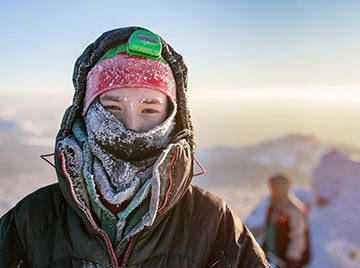FOR IMMEDIATE RELEASE
ACS News Service Weekly PressPac: January 19, 2022
Antifreeze cream prevents frostbite injuries to skin
"A Combination of Synthetic Molecules Acts as Antifreeze for the Protection of Skin against Cold-Induced Injuries"
ACS Applied Bio Materials
Skiers, hikers, soldiers and others exposed to extreme cold temperatures can experience frostbite — a painful injury that occurs when ice crystals form in the skin. Many extremely cold areas are also remote, and delays in frostbite treatment can result in severe wounds, scarring and even limb amputation. Now, researchers reporting in ACS Applied Biomaterials have developed a cream that prevents frostbite injuries in mice when applied to the skin 15 minutes before severe cold exposure.
Frostbite not only kills skin cells, but can also harm deeper tissues like muscle and bone, sometimes causing secondary infections and permanent nerve damage. Common therapies, such as rapid rewarming of the affected limb, aim to reverse tissue freezing, but by the time of treatment, many cells have already died. Recently, scientists have developed frostbite prevention strategies, such as electric heaters sewn into clothing or transgenic antifreeze proteins, but such approaches are often costly, impractical or have safety concerns. Therefore, Munia Ganguli and colleagues wanted to test the frostbite prevention properties of a combination of synthetic molecules commonly used in labs to cryopreserve cells. Dimethyl sulfoxide (DMSO) keeps ice crystals from forming inside cells, whereas poly(vinyl alcohol) (PVA) prevents ice crystals in the spaces between cells, which can damage membranes.
The researchers first tested the ability of different amounts of DMSO and PVA, alone or in combination, to prevent the death of cultured cells in a dish that were exposed to a freezing temperature. They found that 2% DMSO combined with 1.6 mg/mL PVA yielded the highest cell survival (about 80%), while protecting the cell membrane and cytoskeleton. This combination, which the researchers called SynAFP, also allowed cells to divide and express proteins more normally after cold stress. Then, the team mixed SynAFP with a commercial aloe vera cream and applied it to the skin of mice 15 minutes before a cold challenge. The cream reduced frostbite wound size, tissue damage and inflammation, and sped healing, compared with no treatment. The cream did not prevent frostbite when applied 30 minutes or more before the cold challenge; however, multiple applications did not damage skin. The effects of the antifreeze cream in people, and how frequently it needs to be reapplied, must still be determined, the researchers say.
The authors acknowledge funding from the Defence Research and Development Organisation, the Department of Biotechnology Junior Research Fellowship and the Council of Scientific & Industrial Research (CSIR).
###
The American Chemical Society (ACS) is a nonprofit organization chartered by the U.S. Congress. ACS’ mission is to advance the broader chemistry enterprise and its practitioners for the benefit of Earth and all its people. The Society is a global leader in promoting excellence in science education and providing access to chemistry-related information and research through its multiple research solutions, peer-reviewed journals, scientific conferences, eBooks and weekly news periodical Chemical & Engineering News. ACS journals are among the most cited, most trusted and most read within the scientific literature; however, ACS itself does not conduct chemical research. As a leader in scientific information solutions, its CAS division partners with global innovators to accelerate breakthroughs by curating, connecting and analyzing the world’s scientific knowledge. ACS’ main offices are in Washington, D.C., and Columbus, Ohio.
To automatically receive press releases from the American Chemical Society, contact newsroom@acs.org.
Note: ACS does not conduct research, but publishes and publicizes peer-reviewed scientific studies.
Media Contact
ACS Newsroom
newsroom@acs.org


